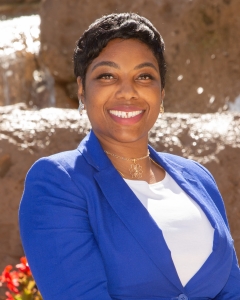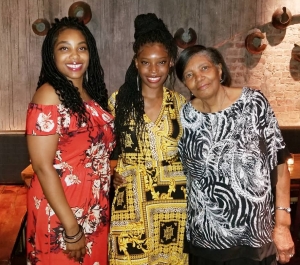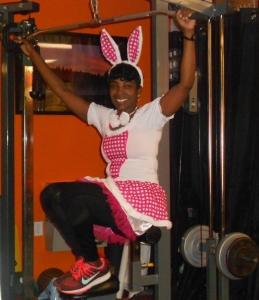
Merida Bourjolly, President of DPC Education Center Board of Directors
Merida Bourjolly had a kidney removed when she was just three weeks old, though it wouldn’t be until much later that her experience with dialysis would begin.
By then, she already owned her own business and had both a teenage daughter and her mother to take care of at home, which meant starting dialysis came with big adjustments. She did her best to continue working five to six days a week like she had before, but found she was increasingly tired while styling her clients’ hair. Eventually, she had to scale back and only work on the days she did not do her dialysis treatments.
Adjusting her work schedule didn’t mean Merida slowed down, though. It was important to her to keep moving forward, to stay active, and to not feel sorry for herself. She still wanted to be able to go to her daughter’s plays, travel when she was able, and support her family. For Merida, that meant cooking at home as part of a food preparation business that helped raise money when she wasn’t able to go in for work.
Merida’s friends also helped her to stay active. They frequently called to check in, made sure she stayed on top of her treatment schedule, challenged her to stay positive, and kept her from feeling lonely when the mental toll of dialysis treatments started to weigh on her.
She also found immense support from the rest of her family. After she began dialysis, her brother would ask her about the treatments she was receiving and how they affected her body, always encouraging her to learn more and take a proactive approach to her care. However, when Merida asked other patients some of the questions her brother had asked her, she found that answers were hard to come by. She knew she needed to learn more.
Nurses provided some answers, but Merida wanted to go more in-depth. She began taking night classes to become a dialysis technician at a local university. On the days that she had treatment, she would take a bit of time to recover and then head to class, where she learned what she needed to know in order to take charge of her care and have confidence in the decisions she made. It also helped her to teach her family about what she was going through so they could better understand it as well.
While she was on dialysis, Merida also was working hard to find a transplant. She was listed for one in New York, but also was aware that the state had long wait times, sometimes longer than 10 years. Once she found out she could get on the waitlist in Pennsylvania, where wait times were usually shorter, she transferred a portion of her hours there to boost her odds. Some of her family members were also tested as possible donors, but none qualified.
Two and a half years later, the call came from Pennsylvania that she could finally receive her transplant. She noticed the difference immediately after the surgery. She felt stronger and more motivated, and found that food even tasted better. She felt so much better, in fact, that the transplant team had to tell her to take it easy while she recovered from the surgery to avoid putting too much strain on her body.
 As she recovered, Merida was also able to return to work full-time and be more available to her family in ways that were more difficult before. She no longer had to schedule events around her appointments, and never had to leave a family function early to receive treatment.
As she recovered, Merida was also able to return to work full-time and be more available to her family in ways that were more difficult before. She no longer had to schedule events around her appointments, and never had to leave a family function early to receive treatment.
Merida has also dedicated herself to becoming an advocate for dialysis patients. When she was undergoing treatment, she felt it was hard to relate to the other patients at her clinic, as she was the youngest there. When she went in search of a support network within the dialysis community, she found Dialysis Patient Citizens (DPC).
At DPC she found people who were not only supportive and had the information she was looking for, but who were also fighting for dialysis patients on a different level than she had seen before. She wanted to engage more with the policies affecting patients and push for laws that both made patients’ lives easier and made coverage more accessible.
Participating in her first Advocacy Day in 2017 was just the start for Merida at DPC. Now, she is a member of the DPC Board of Directors as well as president of the Board of Directors of the DPC Education Center.
As part of her advocacy, Merida helps patients by encouraging them to stay positive. She wants patients to understand that there will be days they aren’t feeling well, and it is ok to feel that way, but it is also important to find ways to pick yourself back up.
For Merida, that meant continuing to work when she could and taking a proactive part in her care. If patients are working a physically strenuous job that is more difficult to continue while on dialysis, then she encourages patients to find a hobby they love, find ways to stay active, and work with a social worker to understand the wide range of travel possibilities while still making arrangements for dialysis treatment.
Most importantly, she encourages patients to be their own biggest advocate. It is important for patients to speak up when they need to, teach the people around them what they are going through, and avoid falling into a place where they feel helpless. Life on dialysis can be incredibly fulfilling, and understanding that is crucial for staying positive.
Do you want to join Merida in advocating for dialysis patients to ensure they can lead the lives they want to live? We would love to hear from you! If you would like to speak with any of our advocates, or learn how to become one yourself, feel free to get in touch with us at www.dialysispatients.org or by calling (866) 877-4242.




